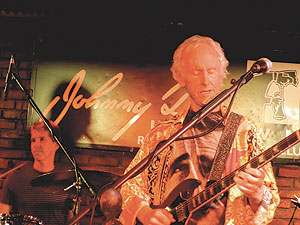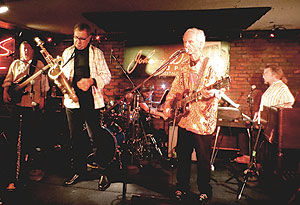
Legendary guitarist Robby Krieger’s latest musical project brought jazz flavored rock to the house at Johnny D’s last week. – Photos by Blake Maddux
By Blake Maddux
Although they certainly have marquee value, it probably is not necessary for venues to use the words “Doors Guitarist” in front of Robby Krieger’s name. Anyone who knows the name knows the person to whom it belongs.
Most people probably do not consider Krieger’s guitar to have been the lead instrument in the music of The Doors. That distinction would most likely go to Ray Manzarek’s keyboards. However, The Doors was not a typical rock ‘n roll band, and Krieger’s varied musical interests added tasteful jazz, blues, and flamenco textures to the band’s sound. Of course, Krieger also knew how to rock when the song called for it.
At Johnny D’s Uptown on Friday night, Robby Krieger was far and away the most famous of the distinguished group of musicians on the stage. In terms of talent and musical pedigree, however, he was simply first among equals.
In a bygone era, certain genres had bandleaders for whose groups the most ambitious of aspiring musicians wished to play. If you were a soul or funk player, you aimed to play with James Brown. If jazz was your thing, then Miles Davis was your man. If you were a rocker whose goals were loftier than fame and fortune, you auditioned for Frank Zappa’s band. These were the Ivy League institutions of musicians’ bands.

Robby Krieger’s Jazz Kitchen, featuring (L to R): Arthur Barrow, bass; Larry Klimas, saxophone; Chad Wackerman, drums; Robby Krieger, guitar; and Tommy Mars, keyboards.
Joining Krieger in his Jazz Kitchen on Friday night were three alumni of the Zappa school: the stoic pony-tailed bassist Arthur Barrow, the bespectacled mad scientist keyboard player Tommy Mars, and the baby-faced 52-year-old drummer Chad Wackerman. Playing saxophone was Larry Klimas, who joined the highly eclectic band War in 1980 and – as Krieger pointed out while introducing him – also works with, among many others, Neil Diamond.
That this band was going to sound more like Frank Zappa than The Doors was hinted at by the first song of the set, which was the 1970 Zappa jam Chunga’s Revenge. Krieger mimicked Zappa’s manic, high-speed shredding beautifully on his trademark cherry-colored Gibson SG guitar.
Two other Zappa tunes also made the setlist: Cosmik Debris, from the classic 1974 album Apostrophe (’) and The Meek Shall Inherit Nothing from 1981’s You Are What You Is. As vocalists, Arthur Borrow and Tommy Mars did an impeccable job of aping Frank Zappa’s wisecracking, tongue-in-cheek voice and unique cadence. Mars did the same on the hilarious Zappa-esque song Screen Junkie, on which he asks “Why not turn off the screen?” to a “texting, tweeting fool.”
The first musical reference to The Doors came just past the midway point with an obscure number called Under Waterfall. Several songs later came “One you might recognize” as Krieger put it, which turned out to be an instrumental take on You’re Lost Little Girl from the 1967 Doors recording Strange Days.
After finishing up that song, Krieger – who had long since shed his long sleeves in favor of a James Dean T-shirt – told the enthusiastic and enraptured crowed that it was the best one of the tour.
Early in the show, Krieger and company did a cover of Snake Oil by the legendary jazz drummer Tony Williams. Apart from that and the Doors and Zappa material, much of the set consisted of selections from the 2010 Jazz Kitchen album Singularity. These included the lengthy Russian Caravan and the closing number Trane Running Late, the title of which paid tribute to jazz legend John Coltrane, the man who was clearly a major influence on Krieger’s sax player Larry Klimas.
Although the rest of the band left the stage after that song, keyboardist Tommy Mars remained seated with what apparently turned out to be a cut or sliced finger. The other guys soon returned for an encore, at which time Krieger asked, “What do you want to hear?” The set lists taped to the floor indicated that it was going to be one of two Doors songs: Roadhouse Blues or Riders on the Storm. In the end, the former won out.
Many audience members, several of which sported Doors or Frank Zappa shirts, stayed around for handshakes, pictures, and autographs. One particularly devoted fan had Tommy Mars sign his guitar, which was already covered with the signatures of many of his former Zappa colleagues.















Reader Comments